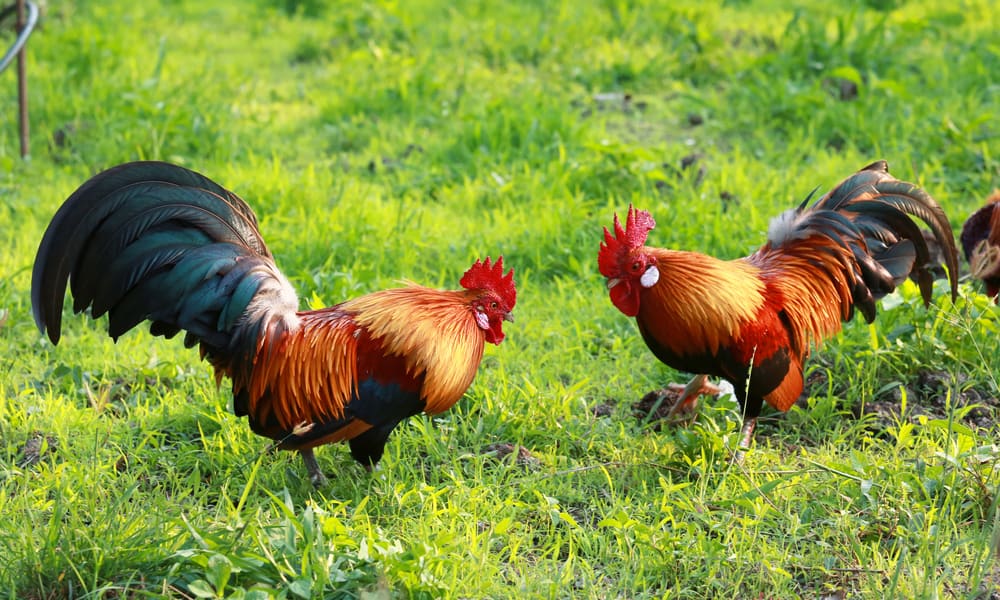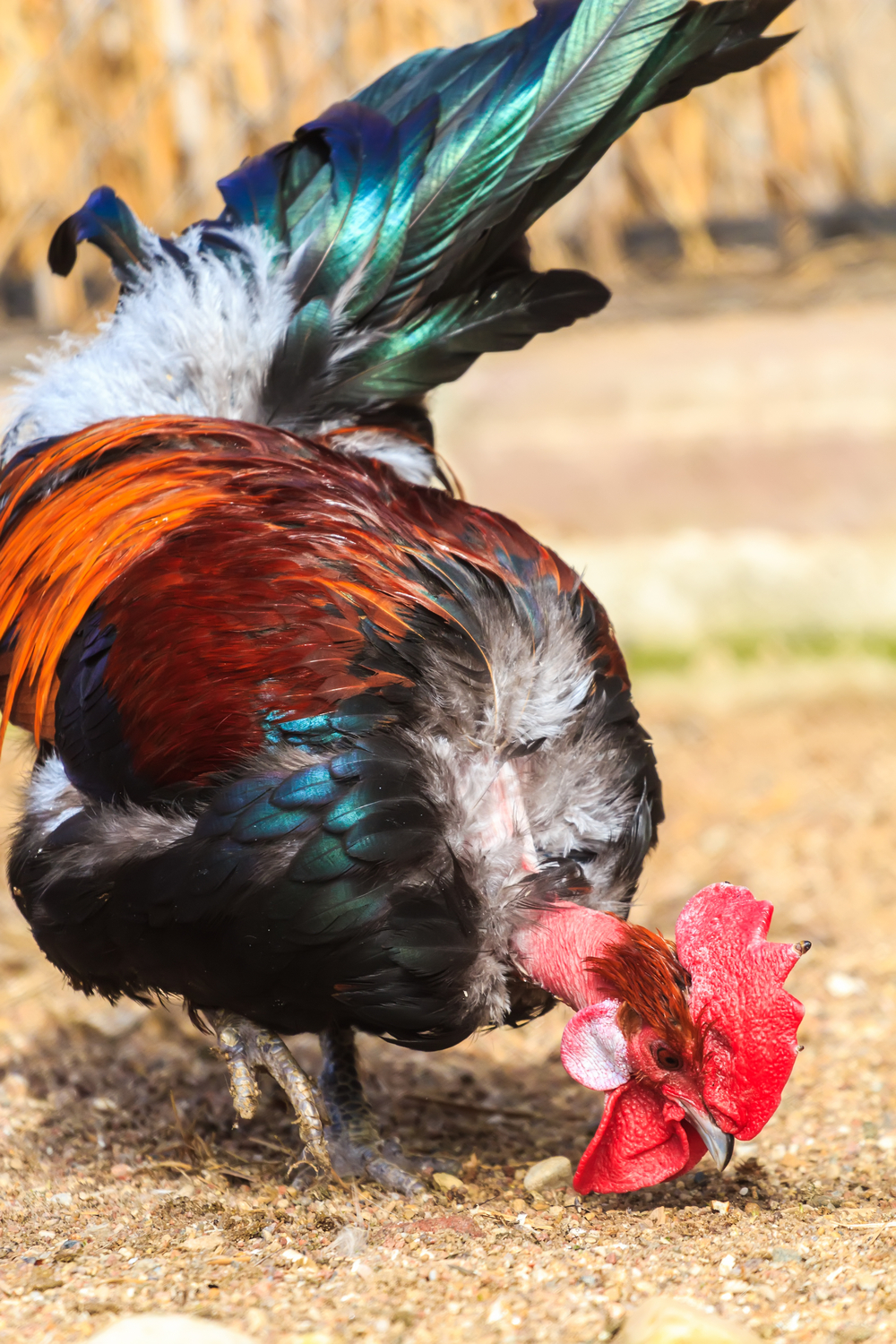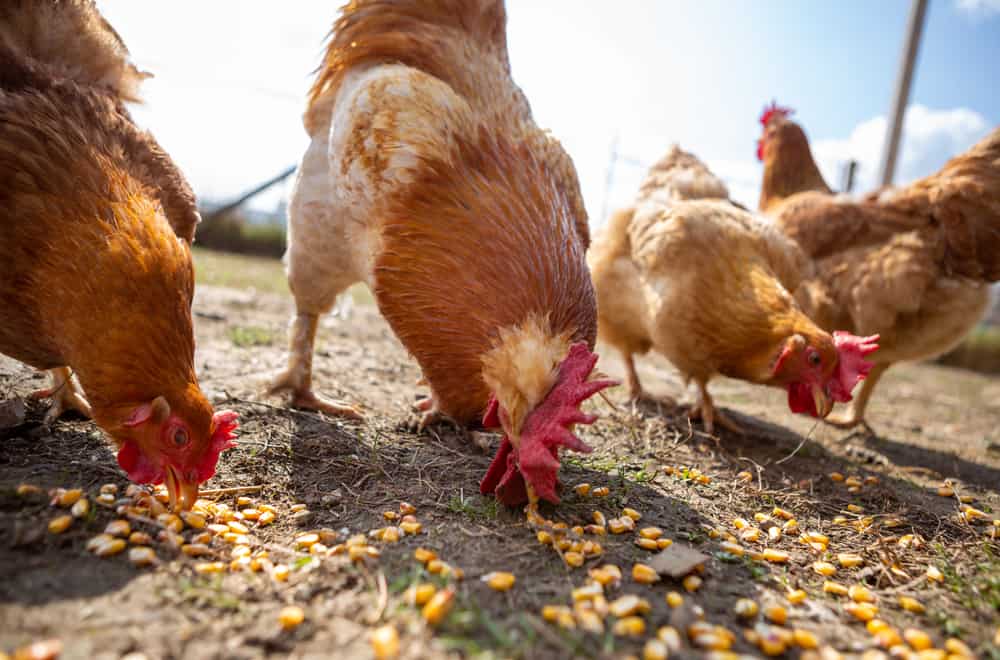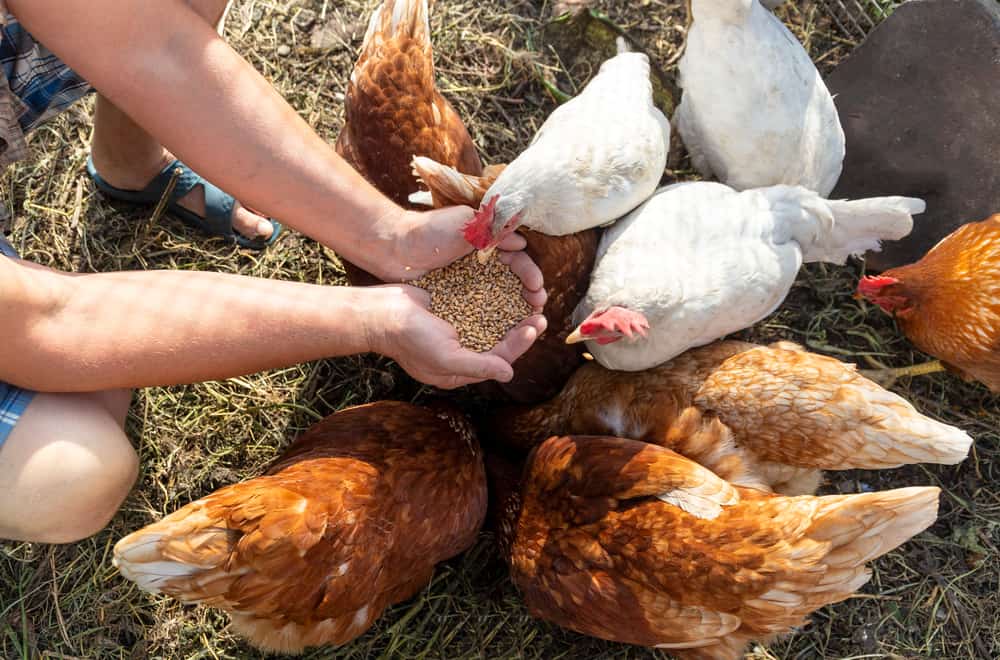Before keeping a flock of roosters, one of the questions you should get an answer to is, “What do roosters eat?” That way, you will be able to get your flock nutritionally balanced feeds that will aid in its growth and in keeping it healthy. It will also help you figure out what foods to avoid. Stay tuned to learn more about roosters’ diet.
Rooster Habits and Biology
Also known as a cockerel, a rooster is a male chicken under the age of one year. If you are hatching your own flock rather than purchasing already hatched chicks, you may be able to tell eggs that will produce roosters from those that will produce hens just by looking at their shape. Usually, rooster eggs will have sharp pointed tips while hen eggs will have a round shape.
One of the reasons people keep roosters is for their meat and breeding. But roosters are aggressive birds, meaning, they are also kept for protecting the female chicken. They are expected to guard the rest of the flock, provide food for them, and alert them when there is danger.
When chicks are young especially when they are newly hatched, it can be difficult to differentiate males from females, as they all look very similar. However, over time, they start showing distinct physical differences that make it easier to identify their gender.
You can tell a rooster from a hen by looking at several features. For instance, roosters tend to be slightly bigger than hens. They also have a thick comb on their head and a prominent wattle on the chin. Hens’ combs and wattles are smaller and thinner.
Roosters are also known for crowing. In fact, male chickens will start to crow as early as 12 weeks old. The crows are squeaky at first but as time goes by, they become louder.
Good roosters will frequently breed with the females to produce fertilized eggs that can hatch into chicks if incubated. Fertilized eggs also get more preference than their unfertilized counterparts when it comes to consumption. Now, whether they have a higher nutritional value than unfertilized eggs is debatable.
Fun Fact: Roosters have hardy sperm. Unlike human’s that stays viable in a woman’s body for only 5 days, a rooster’s sperm can live in a hen’s body for close to 14 days.
What Do Roosters Like to Eat Most?
Roosters are omnivores and will typically feast on plant and animal matter. When let out of the coop, you will see them foraging for bugs and plants, but basically, roosters are curious animals that love to experiment with various foods.
Their eating habits are similar to those of other chickens; the only difference is that roosters are the ones who mostly get food for the hens. Whenever they have food, they will signal them to come eat and will also guide them to places where there is food.
For the most part, a rooster will watch over the females as they eat and will only join in after the hens have eaten some of the food first.
Check out this video of a rooster feeding his hens:
Foods That Roosters Prefer
Just like humans, there are specific food items that roosters like. These include:
- Worms
- Bugs
- Plants
- Plant products like sunflower seeds, corn, and millet
They also love:
- Cooked rice, noodles, and cheese – You can occasionally feed them these while you dine.
- Russian kale, lettuce, and other leafy vegetables – Wash these thoroughly to get rid of any chemicals.
- Fatty foods – Provide these in moderation, as excessive consumption can make the roosters overweight.
- Moist cantaloupes – Offer cantaloupes during the hot months of summer to cool the birds.
Combine the above foods so your roosters can enjoy a wholesome, healthy diet.
How Do These Foods Benefit Your Roosters?
Worms and bugs: These are a crucial source of protein. Roosters, like all animals with feathers, need protein to grow strong feathers. The feathers protect them against cold, winds, and other elements. Studies have shown that chicken feathers comprise up to 30% of the total protein contained in their body.
Plants and leafy vegetables: Any rooster needs a good amount of greens for healthy growth. Plants and veggies have lots of vitamins, antioxidants, and nutrients that can boost your chickens’ immune system. They can also keep their feathers thick and healthy.
Cooked rice, noodles, and fatty foods: Like humans, your roosters require carbohydrates to generate the energy they need for their legwork such as scratching and digging for bugs and chasing predators that come near their hens. Rice and noodles can be an excellent source of energy.
Similarly, foods high in fats are stored in the roosters’ bodies to provide energy between meals and through cold winters. But as stated, these should be offered in small amounts to keep the roosters from becoming obese. Being overweight can put the chickens at risk of diseases such as atherosclerosis and fatty liver hemorrhagic syndrome.
Cantaloupes: If you are looking for a fruit that will keep your roosters healthy and happy, this is it. Cantaloupe is rich in vitamin C, potassium, and vitamin B6. Not only will it provide your chickens with hydration during summer but also strengthen their bodies, boost their immunity and help them digest food properly.
Foods To Avoid Feeding Your Roosters
- Raw or dried beans: Uncooked beans contain phytohemagglutinin, a toxic protein known to be fatal to poultry. Your roosters will get sick from eating just 3 or 4 of these beans and the illness will progress very quickly. In some instances, this toxin has been found to kill a chicken in less than an hour! Once consumed, there’s nothing you can do to save your roosters.
- Moldy foods: Mold that grows on most foods can be deadly. The mold that grows on corn and nuts, especially, produces aflatoxin, a toxic substance that puts both humans and animals at risk of liver cancer. Do not feed your roosters any food that has mold or rot. Check to see that your flock’s feed isn’t becoming damp too; wet food could also be a breeding ground for mold.
- Green potatoes: Roosters enjoy eating mashed potatoes. They are good for them when fed in moderation. But raw potatoes, especially those green ones that are about to sprout, are bad for poultry. Their peels, flesh, and sprouts contain solanine and chaconine, toxins that can harm your chickens. If your roosters eat these, they will get drowsy and paralyzed and eventually die.
- Chocolate: While humans can enjoy chocolate without experiencing any harmful effects, roosters risk getting heart problems just from eating a small slice of chocolate. Theobromine, one of the elements contained in chocolates is lethal to chickens and will kill your roosters in less than 24 hours of consuming the chocolate.
- Avocado pits and skin: These contain a toxin called persin that, if consumed in large quantities, can put your roosters in danger. If you must feed your birds avocado, give them the flesh. It still has persin but the levels are not as high as they are in the pit and skin.
Tips to Feed Roosters
1. Have Clean, Fresh Water Available All the Time
Your roosters need access to clean water at all times, but more importantly when they are having their meal. The water helps soften the food and initiate the digestion process.
On a normal day, one adult rooster will need roughly about 400 ml of water. However, during summer when the weather is extremely hot, allow 2 to 3 times their normal usage. Not providing enough water especially in hot weather can cause dehydration.
Chicken bodies are made of 70% water and losing just 10% of that can cause death. In fact, chickens in hot weather will start to die within 10 hours if they are not given water or enough of it.
2. Establish a Feeding Schedule
Roosters need to eat regularly, meaning, their feeders should have quality food always. An effective way to ensure your birds are eating properly is to create a feeding schedule. For instance, fill their feeders in the morning and allow them to free-range for about an hour in the afternoon.
Feeding regularly will help you keep track of your roosters’ eating habits. Refusing to eat could be a sign that something is wrong.
3. Keep Feeders Clean
Make sure you are not leaving any leftover foods in the rooster feeders, as these can attract flies and rats. Similarly, keep waterers clean. Always wash them with soap before refilling to prevent bacteria growth.
For more tips on what and how to feed roosters (and chickens in general), watch this video:
Summary
Roosters have quite a vast diet. However, they prefer eating bugs and plant products. They may also enjoy a few food items from your kitchen. To keep your roosters healthy, give them well-balanced meals and avoid foods that may contain harmful toxins like raw beans and potatoes, moldy corn, and chocolate.




A rooster flu in the yard it’s been here about 10 days or more and my granddaughter been feeding him bird food from the store what can I do to help him be a good rooster and be stabilized he doesn’t want to leave and she wants to keep him
We inherited a rooster he came in our garage once we got him out he walked around our yard and we thought he left. Our neighbor said he’s a fighting rooster cuz he has a blue band on his claw. I need to find a home for him any advice